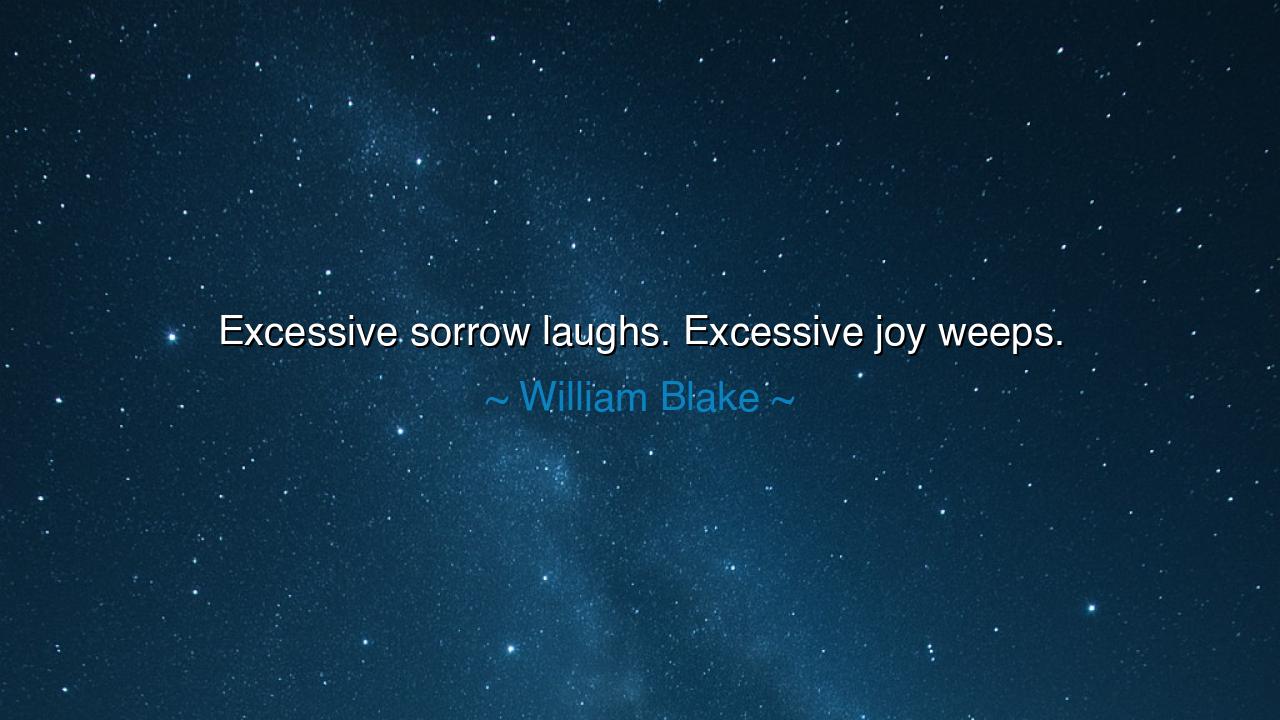
Excessive sorrow laughs. Excessive joy weeps.






“Excessive sorrow laughs. Excessive joy weeps.” Thus wrote William Blake, the mystic poet who saw the hidden currents of the human soul. In these words, he reveals the paradox that lies at the heart of emotion: that when the heart is overwhelmed, it overflows in strange and opposite ways. The sorrow too heavy to bear breaks into laughter, not because the pain is gone, but because the spirit cannot contain the storm within. Likewise, the joy too radiant to endure melts into tears, for the soul trembles at the weight of its own delight. This is the mystery of the human heart—it speaks in contradictions when it is closest to truth.
The ancients knew this. They told of men and women who laughed in their grief, not from mockery but from the madness of suffering. When Cassandra foresaw the fall of Troy, who listened? Her words were bitter prophecy, but her anguish often took the form of frantic, desperate laughter. And yet, who could deny her grief? For when sorrow presses beyond the limits of the tongue, the body finds another vessel. Excessive sorrow laughs—and in that laughter, the world beholds not levity but the shadow of despair.
In the same manner, joy that overflows does not shout but breaks into weeping. Who has not seen a bride shed tears as she walks to her beloved, or a parent weep upon holding their child for the first time? The happiness is so vast, so uncontainable, that it bursts the bounds of laughter and becomes tears. Excessive joy weeps—because the heart, overwhelmed, finds its release not in sound but in silence, not in triumph but in surrender. These are not tears of sorrow but of awe, for joy too deep humbles the spirit.
Consider the tale of Nelson Mandela. After twenty-seven years in prison, when he finally walked free, the world expected him to smile with triumph. But witnesses recall his solemnity, the moistness of his eyes, as though he carried both the unbearable grief of lost years and the unbearable joy of newfound freedom. Was this not Blake’s truth made flesh? That sorrow and joy, when stretched to their extremes, become indistinguishable in their expression? For the soul at its limits does not divide emotion neatly; it overflows, and the overflow may take any form.
From this paradox we learn that the deepest emotions live beyond the reach of words and even beyond the control of reason. Laughter and tears are but vessels, and in the extremity of experience they trade places, carrying whatever the soul cannot contain. To judge such expressions is folly; to understand them is wisdom. For in the sight of one who laughs while grieving or weeps while rejoicing, we are not seeing confusion but truth revealed in its rawest form.
What lesson, then, must we take? It is this: do not be ashamed when your sorrow bursts forth in laughter, or your joy dissolves into tears. These are not signs of weakness but signs of depth, the proof that your heart is alive and vast enough to hold the extremes of human feeling. Embrace them as sacred. Let sorrow laugh if it must, let joy weep if it will, for in such moments you stand at the threshold of the eternal, where opposites meet and truth shines through.
Practically, learn to honor these moments when they come. When grief overwhelms you, do not force solemnity—if laughter rises, let it rise, for it may be your soul’s way of breathing. When joy overwhelms you, do not hide your tears, for they are the purest offering your heart can give. And when you see others in these paradoxes, do not misunderstand them. Offer compassion, offer presence, and see in their tears or laughter the mystery of being human.
Thus, remember Blake’s words: “Excessive sorrow laughs. Excessive joy weeps.” For they teach us that the heart, when most honest, speaks in contradictions. To live fully is to allow these contradictions, to welcome them as signs of a life richly felt. In laughter born of sorrow and in tears born of joy, we find the sacred mirror of our humanity, fragile yet profound, fleeting yet eternal.






AAdministratorAdministrator
Welcome, honored guests. Please leave a comment, we will respond soon